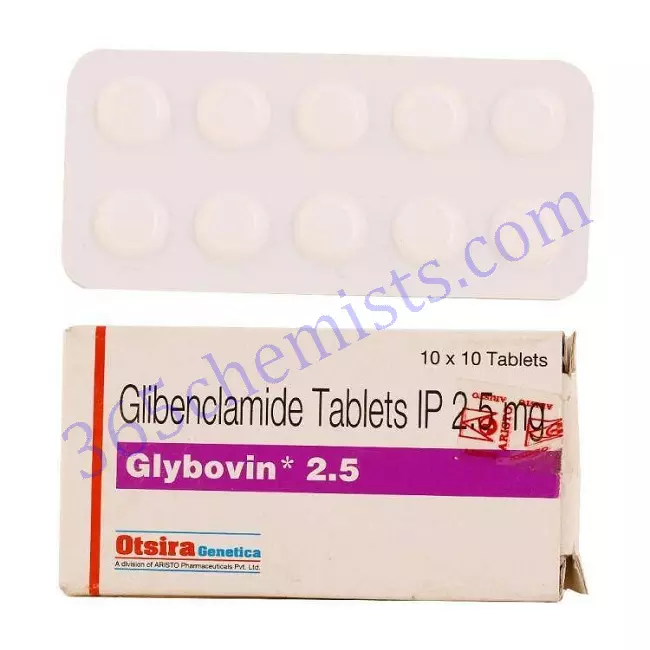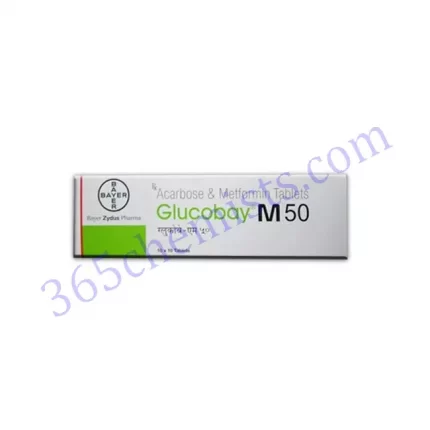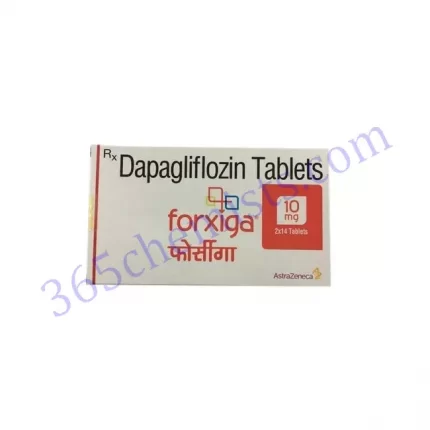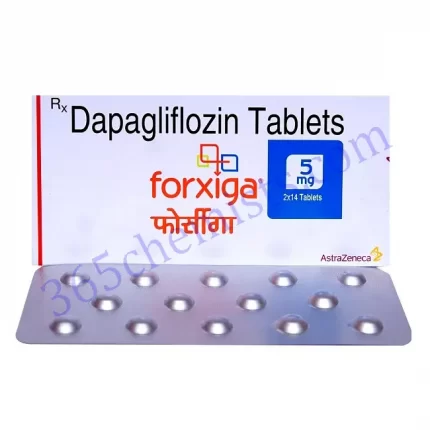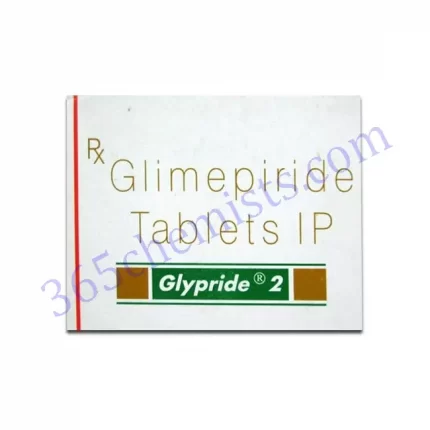Glybovin 2.5 Tablet: A Comprehensive Overview of Glibenclamide 2.5mg
Glybovin 2.5 Tablet is a medicine that is frequently used for the management of diabetes mellitus type 2. Glibenclamide, in a dosage strength of 2.5 milligrammes, is included as the active ingredient in this product. People who have diabetes can benefit from better glycemic control as a result of the high level of effectiveness that this pill possesses in lowering and maintaining blood glucose levels. In this post, we will get into the specifics of the Glybovin 2.5 Tablet, including its mode of action, benefits, dose, potential side effects, and precautions.
How Glybovin 2.5 Tablet Works
The Glybovin 2.5 Tablet is classified as a member of the group of drugs known as sulfonylureas. It accomplishes this by boosting the secretion of insulin from the pancreas, which in turn assists in maintaining normal levels of blood sugar. The active ingredient in Glybovin 2.5 Tablet, glibenclamide, binds to ATP-dependent potassium channels located on the surface of pancreatic beta cells. This binding results in the closure of these channels, which in turn causes beta cells to become depolarized, which in turn results in the release of insulin. An increase in insulin secretion makes it easier for the tissues in the periphery of the body to absorb glucose, which leads to a reduction in the amount of sugar in the blood.
Benefits and Efficacy
It has been demonstrated that the Glybovin 2.5 Tablet is extremely helpful in the management of type 2 diabetes. It achieves this by boosting insulin secretion, which in turn helps lower blood sugar levels both before and after meals, resulting in improved glycemic control. Not only does this drug help in the control of diabetes, but it also plays an important part in preventing problems that are associated with diabetes. Glybovin 2.5 Tablet lowers the risk of kidney damage, neurological disorders, cardiovascular diseases, and other issues associated with diabetes that is not under control by ensuring that optimal levels of glucose are maintained in the blood.
Dosage and Administration
It is possible for the recommended dosage of Glybovin 2.5 Tablet to change for each individual patient based on factors such as the nature and severity of their ailment, their past medical history, and how well they respond to treatment. It is critical to carefully adhere to the directions provided by the healthcare expert or the dosage that is specified on the product’s box. The initial dose that is indicated for adults is typically between 1.25 mg and 2.5 mg taken once daily. However, the dosage may be altered depending on the levels of glucose in the blood and how well the medication is working. It is recommended that the Glybovin 2.5 Tablet be taken during or immediately after a meal in order to increase the likelihood that it will be absorbed and minimise the risk of gastrointestinal adverse effects.
Related Product
Glybovin 2.5mg Tablet
Glybovin 5mg Tablet
Glybovin 1.25mg Tablet
Precautions and Possible Side Effects
Even though the Glybovin 2.5 Tablet is generally well taken, it is essential to observe all of the appropriate safety precautions and be aware of any potential adverse effects. Hypoglycemia, often known as low blood sugar, nausea, vomiting, abdominal discomfort, and skin rash are some of the common adverse effects that may occur. These adverse effects are often modest and fleeting, and they go away without any intervention on the patient’s part. However, it is best to seek medical assistance if any adverse effect lasts for an extended period of time or becomes intolerable. When taking Glybovin 2.5 Tablet, those who have a history of sulfa medication allergies, as well as those who have compromised liver or kidney function, should exercise extreme caution. Before beginning treatment with this medicine, it is usually advisable to confer with a qualified medical expert.
Benefits of Glybovin 2.5 Tablet
Control of Blood Glucose That Is Efficient The Glybovin 2.5 Tablet was developed with the express purpose of providing efficient control of blood glucose levels in patients who have type 2 diabetes. It accomplishes this by the pancreas being stimulated to produce more insulin, which in turn helps to bring down increased blood sugar levels and keep them within a safe range. This helps to contribute to better overall glycemic control and minimises the risk of problems that are connected with diabetes that is not under control.
Enhanced Insulin Sensitivity In addition to promoting insulin secretion, Glybovin 2.5 Tablet also improves the sensitivity of peripheral tissues to insulin. This effect is achieved by increasing the concentration of glybovin in the blood. This indicates that the cells of the body become more responsive to the activities of insulin, allowing for improved glucose uptake and utilisation. An increase in insulin sensitivity both contributes to the maintenance of stable blood sugar levels and bolsters the activity of the metabolic system.
Individuals who have different requirements can benefit from the flexibility offered by the dose options provided by the Glybovin 2.5 Tablet, which is available in a dosage level of 2.5 mg. It makes it possible to fine-tune the dosage of the drug in accordance with the individual’s response to therapy and the levels of glucose in their blood. This offers a personalised and customised approach to diabetes care, which in turn promotes the best possible outcomes.
The Glybovin 2.5 Tablet is an essential component in our comprehensive approach to minimising the risk of diabetic complications and maximising patient well-being. It does this by successfully managing the levels of sugar in the blood, which in turn lowers the risk of long-term consequences caused by diabetes, such as diabetic nephropathy (damage to the kidneys), neuropathy (disorders of the nerves), retinopathy (damage to the eyes), and cardiovascular diseases. Diabetes that is managed effectively with Glybovin 2.5 Tablet can lead to considerable improvements in both an individual’s general health and their quality of life.
Interactions with Other Medications
There is a possibility that the Glybovin 2.5 Tablet will interact with other medications, which could reduce the medication’s effectiveness or raise the risk of its side effects. It is extremely important to let the healthcare professional know about any and all medications that are being used, whether they are prescribed, purchased over the counter, or taken in the form of herbal supplements. It is possible for medications such as beta-blockers, nonsteroidal anti-inflammatory medicines (NSAIDs), and some antibiotics to either intensify the effects of Glybovin 2.5 Tablet or lessen their severity. When using such medications concurrently with Glybovin 2.5 Tablet, it is possible that close monitoring and modifications to the prescribed dose will be required.
Conclusion
Glybovin 2.5 Tablet is a highly successful drug for the management of diabetes type 2 mellitus. Each tablet contains 2.5 milligrammes of the active ingredient glibenclamide. It does this by helping to manage blood sugar levels, improving glycemic control, and lowering the risk of problems connected to diabetes. For the Glybovin 2.5 Tablet to be used in a manner that is both safe and effective, it is imperative that the recommended dosage be strictly adhered to, that the instructions provided by a medical practitioner be carefully followed, and that users be informed of any potential adverse effects and safety precautions. persons who have type 2 diabetes continue to have access to a vital treatment choice in the form of Glybovin 2.5 Tablet since it has been shown to be effective and has a safety profile that has been well investigated and vetted. This contributes to the persons’ general health and well-being.

